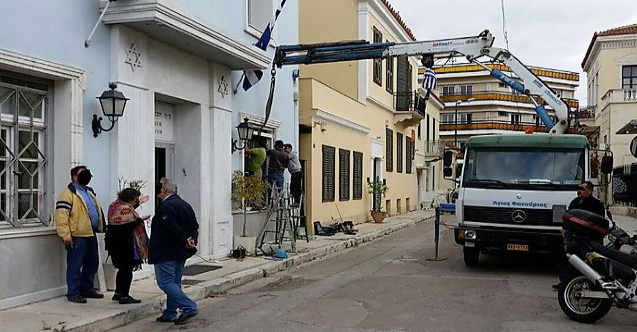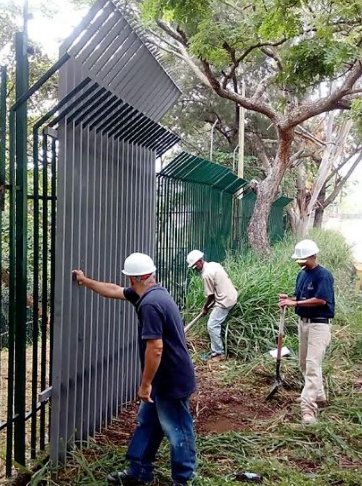David Harris

How You Help: Jewish Agency for Israel Ups Security in Jewish Communities around the World
As Jews, we revel in the achievements and endurance of our people over the last 5778 years, while at the same time we are keenly aware of our history of persecution, expulsion, and worse. This is why, due to the rise in antisemitic activity in recent years, it was so critical that organizations like the Jewish Agency for Israel take concrete steps to shore up the safety and security of certain Jewish communities across the globe, which often don’t have the knowledge or resources to do so themselves.
To this end, the Emergency Assistance Fund for Jewish Communities was established four years ago, and your contributions to the Jewish Federation help to support it, through the Federation’s partnership with the Jewish Agency. We can all take solace in the knowledge that even living in Cincinnati, Ohio, we are able to assist Jews living in parts of the world with limited means to protect themselves during these turbulent times. —Bonnie Ullner, Board member, Jewish Federation and JCRC; Cochair, Israel and Overseas Committee
By Itamar Eichner
This article was originally published in Ynetnews.
Following the rise in anti-Semitic activity around the world, The Jewish Agency’s Emergency Assistance Fund for Jewish Communities has helped over 200 Jewish communities and organizations protect themselves.
The Jewish Agency for Israel, which usually deals with immigration to Israel and Zionism among Jewish communities around the world, has been funding security measures for Jewish communities over the past four years in light of the rise in anti-Semitic incidents.
110 synagogues, 80 schools and preschools, and 75 community centers are just a few of the projects taken on by the The Jewish Agency’s Emergency Assistance Fund for Jewish Communities, which is revealed here for the first time, on the occasion of International Holocaust Remembrance Day.
115 communities have secured the entrances to buildings, 90 communities installed closed circuit television systems, fences were built around 50 Jewish community facilities, and 30 institutions installed gates and padlocks for the safety of the community’s population thanks to the Fund’s support. In addition, protective equipment was donated to numerous communities.

‘Preventing another Toulouse’
The Fund was set up following the Toulouse terror attack in 2012, which claimed the lives of a teacher and three students at a Jewish school. The terrorist entered the school freely, without any security measures—a gate, a camera, a guard, or a screening booth—to stop him. It was Natan Sharansky, the chairman of The Jewish Agency, who initiated the establishment of the Fund.
“We know that a terrorist looking to harm Jews will look for the easiest target, and any security measure standing in his way will contribute to deterrence,” explained Josh Schwarcz, The Jewish Agency’s secretary-general, who directs the Emergency Assistance Fund.
“We asked ourselves which other communities worldwide face similar situations and how many such schools do not have the means to protect themselves. This took place at the same time as the rise in global anti-Semitism, the return of ISIS fighters from Syria and Iraq to Europe, a rise in the level of threats, and the number of murderous terror attacks. In coordination with the government, we decided to set up the Fund for Jewish communities, based on the core value that ‘all Israel are responsible for one another,’” Schwarcz continued.
33.5 NIS million to protect the Jewish communities
The Fund collects contributions from Jewish donors around the world, without any Israeli governmental funding. So far, the Fund has helped over 200 Jewish communities and organizations worldwide, and allotted NIS 33.5 million for security measures in those communities.
Any Jewish community interested in receiving monetary assistance needs to submit a detailed application via the internet, specifying its needs: a fence, cameras, gates, screening booths, concrete obstacles, bullet proof glass, intercom and locking systems, and so on.
Security officers working on behalf of the Fund visit the community to examine its request. Many times the security officer discovers that the request was simply impractical. For instance, one community asked to install 20 cameras, but the officer reached the conclusion that a much smaller number would be sufficient.
Not in North America
The Fund decided not to subsidize guards for Jewish institutions for financial reasons: in France alone there are 700 Jewish institutions, and the cost of hiring guards for each one would be prohibitive.
There was one exception, though: after the terror attack in the HyperCacher kosher supermarket in Paris, the community experienced tremendous anxiety and there was a serious lack of trained Jewish security guards.
The Fund decided to distribute challenge grants to schools to encourage the hiring of guards based on a matching system: for every shekel put in by the Fund, the community matched it, and after three years, the community commits to taking the funding upon itself.
“Today, thanks to the Fund, there are 23 additional trained Jewish security guards in Jewish schools around France,” said Schwarcz.
The Fund decided against purchasing weapons and instead has been focusing on security measures and protection. “We are helping Jews protect themselves. It is important to note that the Agency is not responsible for the safety of Jews in the Diaspora, but in a climate of fear, Jews simply do not frequent the community’s establishments. Jewish life cannot thrive or, in some cases, even exist. We do not want Jews to make aliyah out of fear, but rather out of a sense of attachment and belonging, which is a large part of why we would like to ensure the safe participation of Jews in Jewish and Zionist activities.”
Among the larger donors to the Fund are the Leona M. and Harry B. Helmsley Charitable Trust, the Genesis Philanthropy Group, and the Jewish Federations of North America. The wealthy and powerful North American communities know how to take care of themselves, representatives of the Fund say, which is why the Fund does not operate there. They mostly help communities of limited resources, as well as communities in distress.
To date, some 58 percent of the funding has gone to Jewish communities in Europe, 15 percent has gone to the former Soviet Union, 15 percent has gone to Latin America, and the remainder has been distributed around the rest of the world.
Schwarcz added that, to the best of his knowledge, most western governments take the issue of keeping Jewish communities safe very seriously, and allot resources for this.
The Jewish Agency for Israel and the Emergency Assistance Fund for Jewish Communities are two of over fifty programs and agencies funded in part by the Jewish Federation of Cincinnati.
The Jewish Federation of Cincinnati: We look at the whole picture, taking into account the diverse needs of the entire community. Together we can do almost anything.
Thanks to you and the help of our partner agencies, 200 communities are better protected.

